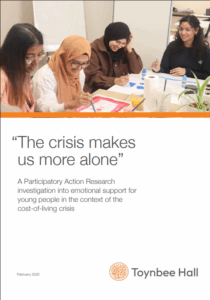This blog is adapted from a LinkedIn post published by our Strategic Programme Manager, Katherine Hill to mark Mental Health Awareness Week 2025
“I feel anxious all the time, like I’m riding a rollercoaster…”
That’s how one parent in London recently described life with young children.
But it wasn’t sleepless nights or toddler tantrums they were talking about — it was poverty.

This Mental Health Awareness Week, I want to highlight two powerful reports published recently by members of 4in10 London’s Child Poverty Network that make something crystal clear: poverty doesn’t just affect bank balances — it affects mental health, emotional resilience, and how people experience the world around them.
Last week, Home-Start London released new research based on interviews with families supported by local Home-Starts across the city. The picture they paint is tough.
– Nearly 9 in 10 families (86%) say that money worries are making parenting harder.
– 81% feel anxious or stressed because of financial pressure.
– And 6 in 10 say it increases their sense of isolation.
“Rent is always our priority, then bills. But in London, the price of everything is going up. It’s been a challenge — we’ve had to go to our local food bank.”
Parent interview
 Earlier this year, Toynbee Hall published “The crisis makes us more alone”, a report led by 12 brilliant young peer researchers from low-income backgrounds in Tower Hamlets. Their work explores how the cost-of-living crisis is affecting young people’s mental health. The findings are just as powerful and just as worrying:
Earlier this year, Toynbee Hall published “The crisis makes us more alone”, a report led by 12 brilliant young peer researchers from low-income backgrounds in Tower Hamlets. Their work explores how the cost-of-living crisis is affecting young people’s mental health. The findings are just as powerful and just as worrying:
– Over half of the young people surveyed had experienced rising stress within their immediate families.
– Nearly half said their own mental health was getting worse.
– These issues are compounded by financial insecurity, overcrowded housing, and insufficient mental health services, creating a web of challenges that many struggle to navigate.
These two reports, focusing on different stages of young lives, tell the same story: poverty and poor mental health are deeply intertwined.
Struggling to make ends meet doesn’t just fray people’s nerves, it isolates them and makes it harder to access help.
But there is hope – and it lives in our communities. Both pieces of research show the crucial role voluntary and community organisations play in offering support, connection, and understanding. These are the safety nets too often missing or even undermined from national policy.
We don’t need any more proof that poverty damages lives. What we need is action. We need policies that recognise that mental health isn’t just about individual resilience – it’s about the social and economic conditions we create.

